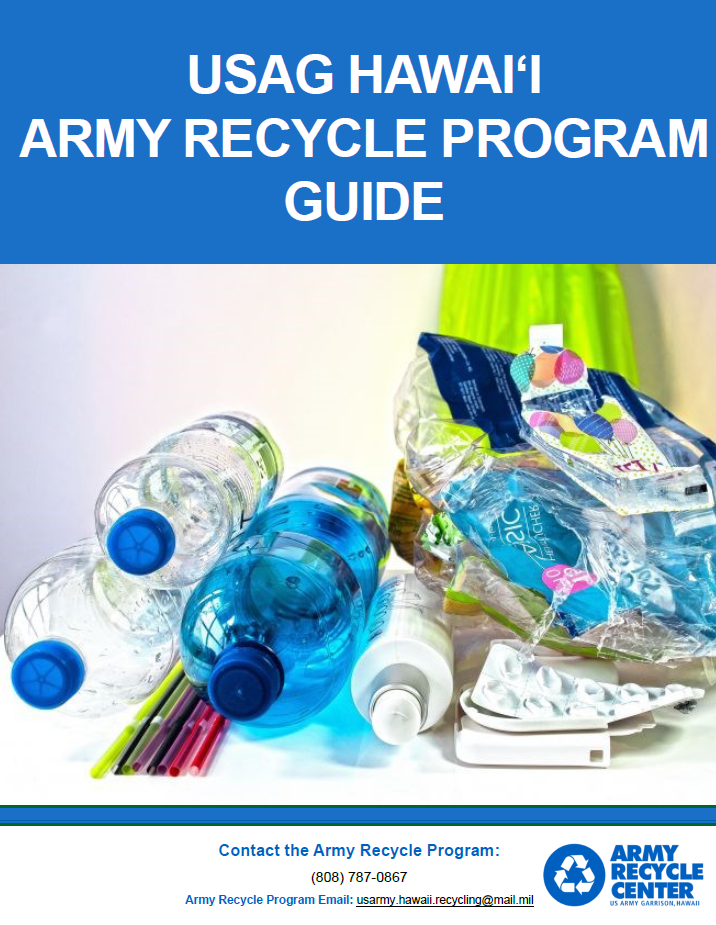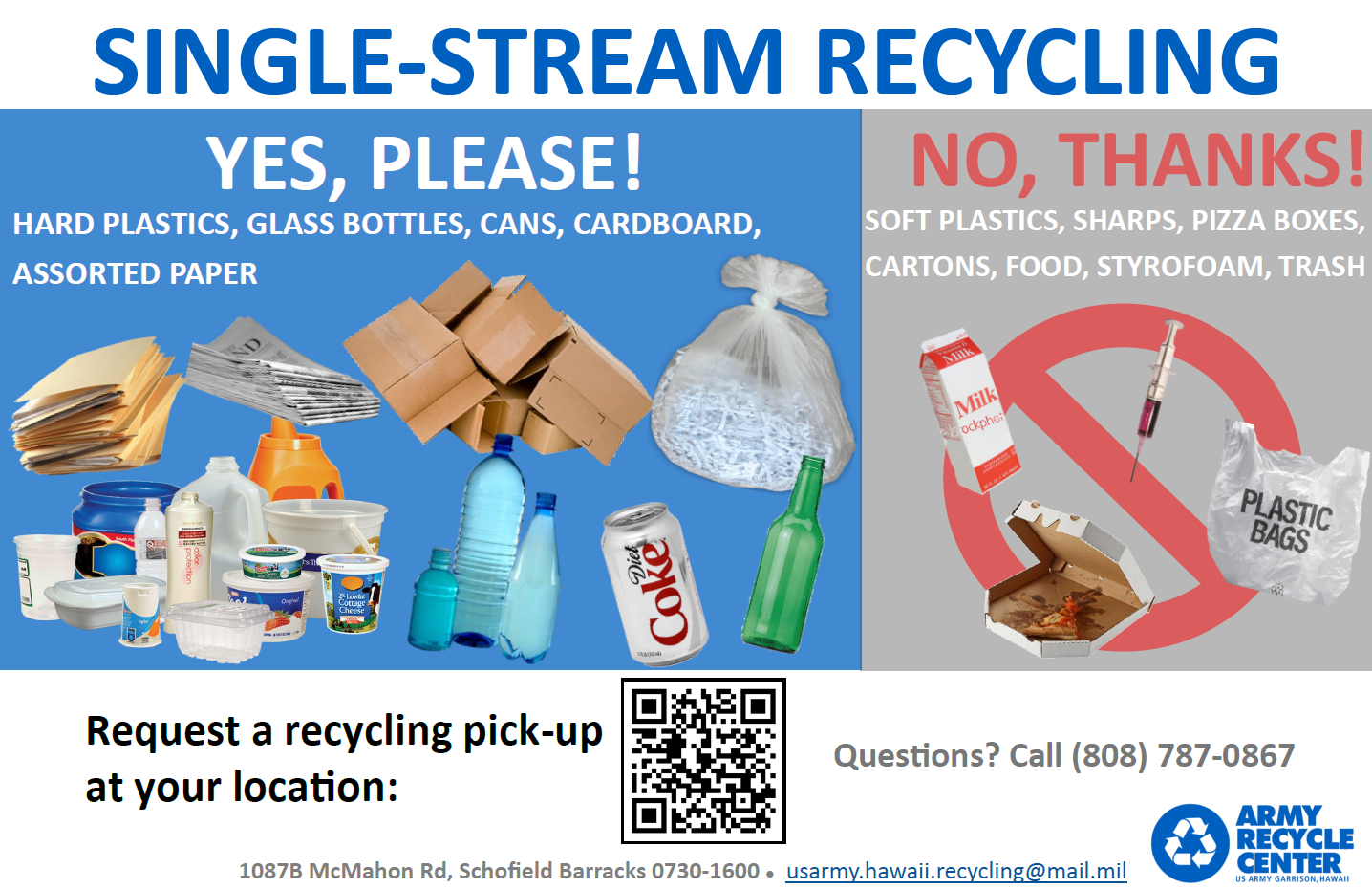Overview
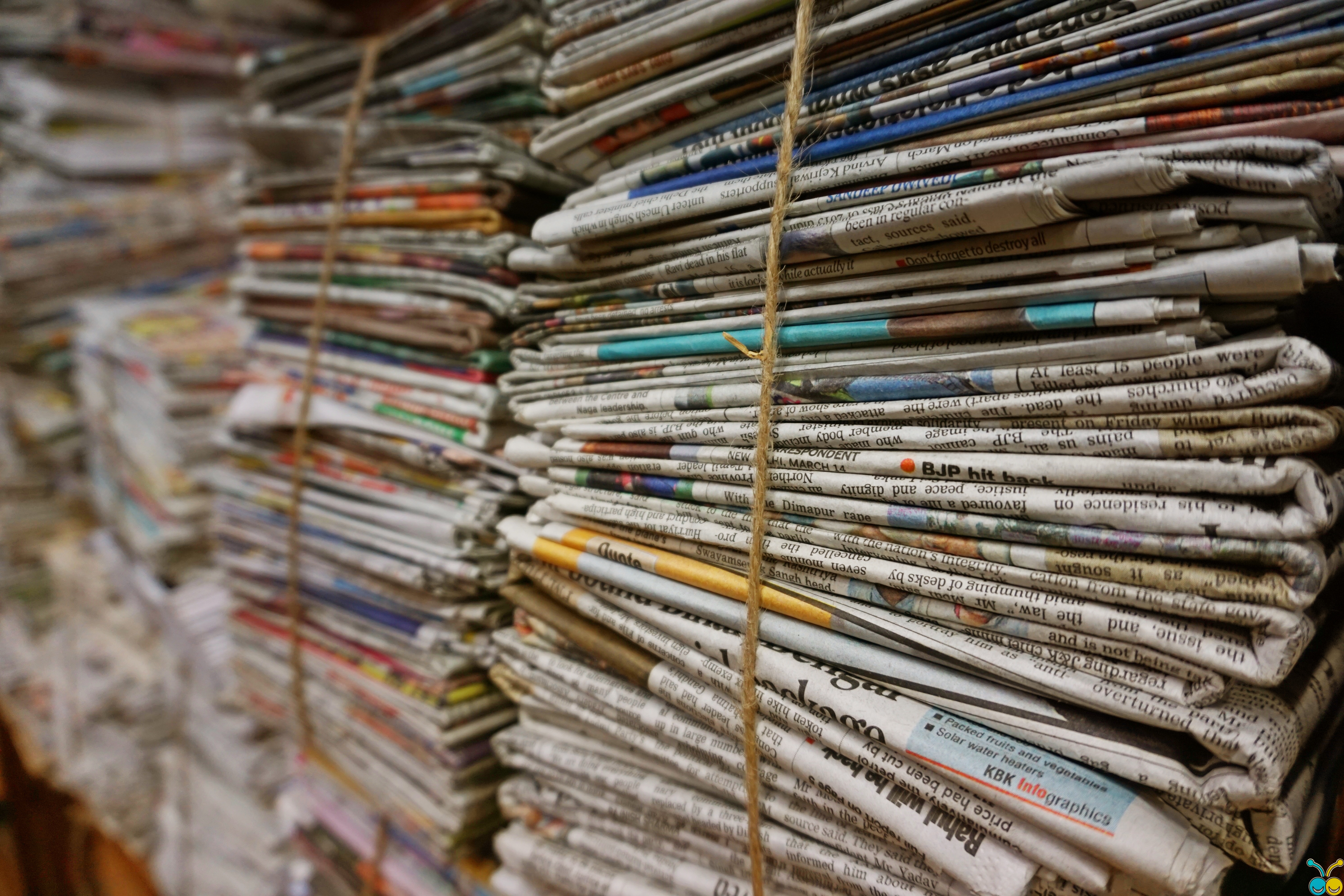
The Solid Waste & Recycling Program focuses on the disposal of solid waste, pollution prevention, and recycling. Its mission is to prevent and minimize waste through reducing, reusing and recycling to decrease the volume of waste being sent to the landfill or the incinerator.
The Solid Waste & Recycling Program runs the garrison's Recycling Center, which is located on Schofield Barracks.
Refer to FAQs below for information on how to request recycling bins and how to request a pick-up for your recyclable material.
Reduce, Reuse, Recycle
Reducing and reusing everyday items is crucial to mitigating our negative impact on our health and the environment. Before making a purchase, ask yourself if you need to buy the goods or materials, or if you are buying more than you need. The best way to reduce waste is not to produce it in the first place!
Recycling is always the last option when you aren't able to reduce or reuse items. When you choose to recycle, you are reducing the need to extract new raw materials from the Earth, and you give that product a new life.
Recycling is a simple, easy way to help the environment and preserve natural resources. Funds generated from U.S. Army Garrison Hawaii's qualified recycling program (QRP) help fund environmental projects and the garrison's 4th of July Fest.
Requirements
The Solid Waste & Recycling Program is guided by various key regulations and laws. U.S. Army Garrison.
Hawaii has a goal of diverting 50% of materials from landfill and incineration which aligns with DOD environmental goals. Currently, the garrison is diverting about 25%
Recycling is MANDATORY. All civilians, soldiers, military personnel, contractors and tenants are required to accurately recycle. The DPW Army Recycle Program can assist personnel with implementing recycling collection areas and recycling pickups.
Contact us for more info: (808) 787-0867
Email: usarmy.hawaii.recycling@army.mil
Frequently Asked Questions
What is solid waste?
Solid Waste is defined as garbage, refuse and other discarded material. Solid waste can be solid, semi-solid, sludge, liquid and contained gaseous materials. Solid waste does not include hazardous waste, or the waste of domestic animals.
What is recycling?
Recycling is defined by the Environmental Protection Agency as the process of collecting and processing materials that would otherwise be thrown away as trash and turning them into new products.
There are three steps to recycling: collection and processing, manufacturing, and purchasing new products made from recycled materials.
When something is recycled it is removed from the solid waste stream, collected, processed and re-manufactured, completing the circle as something new.
For more information, visit https://www.epa.gov/recycle/recycling-basics.
Why recycle?
There are lots of reasons!
- It's mandatory! Check out USAG HI Policy Memo 11, Solid Waste Management and Recycling. This policy applies to daily civilian and military activities as well as special events and functions.
- Reduce the amount of waste sent to landfills and incinerators
- Conserve natural resources such as timber, water and minerals
- Increase economic security by tapping a domestic source of materials
- Prevent pollution by reducing the need to collect new raw materials
- Save energy
- Help create jobs in the recycling and manufacturing industries in the United States
What is single-stream recycling?
Single-stream recycling is a system in which all recyclables, including newspaper, cardboard, plastic, aluminum, junk mail, etc., are placed in a single bin for recycling. These recyclables are collected by a single truck and will be sorted into various commodity streams for sale to markets and ultimately manufactured into new products.
Does single-stream recycling lower the value of the recyclables, and won’t there be a lot of contamination?
Not necessarily. One of the concerns associated with single-stream recycling is that one bin tends to encourage people to suddenly put EVERYTHING that seems recyclable in it. That’s why we need YOU to help demonstrate that a community full of educated, conscientious recyclers can make single-stream recycling a success.
View our guide to single-stream recycling.
Where can I get a recycling bin?
For residential recycling, contact your Island Palm Communities ⚠ community center.
For barracks and other on-post facilities, call (808) 787-0867 to request a recycling bin.
How do I request a pick-up of recyclable material?
For residential recycling, contact your Island Palm Communities ⚠ community center.
For barracks and other on-post facilities, utilize the USAG Hawaii Recycling Pick-Up form: Link to form: Recycling Pick-Up Request Form
Am I required to separate my recyclables from my waste?
YES. Dumpsters containing cardboard and other recyclables will not be picked up and you will be required to remove the recyclable items before your trash is collected.
What materials are accepted at the Army Recycling Center?
Dry corrugated cardboard, mixed paper (white, color, glossy, non-corrugated cardboard), newspaper, shredded paper (must be bagged), plastics #1 - #5 (rinsed), aluminum cans, glass bottles, toner cartridges, scrap metal (no plastic), untreated/unpainted wood & wood pallets (limited quantities), & green waste.
How do I tell what number plastic I have?
There are seven types of consumer plastic or resin codes. Check the bottom of the container for a number #1-5 inside the three chasing arrows logo.
- #1 PETE: Polyethylene Terephthalate
Commonly used in soft drinks, juice, and cough syrup containers and microwave trays. - #2 HDPE: High Density Polyethylene
Commonly used in milk jugs, detergent and shampoo bottles. - #3 V: Polyvinyl Chloride
Commonly used in film for meat packaging and some rigid plastic containers. - #4 LDPE: Low Density Polyethylene
Commonly used in butter cups lids. - #5 PP: Polypropylene
Commonly used in yogurt containers and deli trays. - #6 PS: Polystyrene
Commonly used in plastic cups and plates and to-go containers. - #7 OTHER: Other mixed resins
Commonly used in mixed plastic containers or plastic products.
My unit has old classified documents that need to be destroyed. Can we burn them?
NO. Per local U.S. Army Garrison Hawaii policy and state law, the burning of any material in an open fire is not allowed anywhere on the installation. The garrison does not have a classified document incinerator.
It is recommended that units utilize an approved shredder for classified documents. There are several document destruction companies servicing Hawaii. Many offer mobile truck services where documents are destroyed behind a locked security screen at your location. Once your documents are destroyed, you are given a certificate of destruction, please share this information with the Recycling Program (phone numbers below).
The unit is responsible for selecting a provider for this service and the Army does not endorse any particular company. Prices will vary depending on the services provided, so it will be up to the unit to find the best value. Please contact the Recycling Program at (808) 787-0867/ usarmy.hawaii.recycling@army.mil with questions
Recycle Center
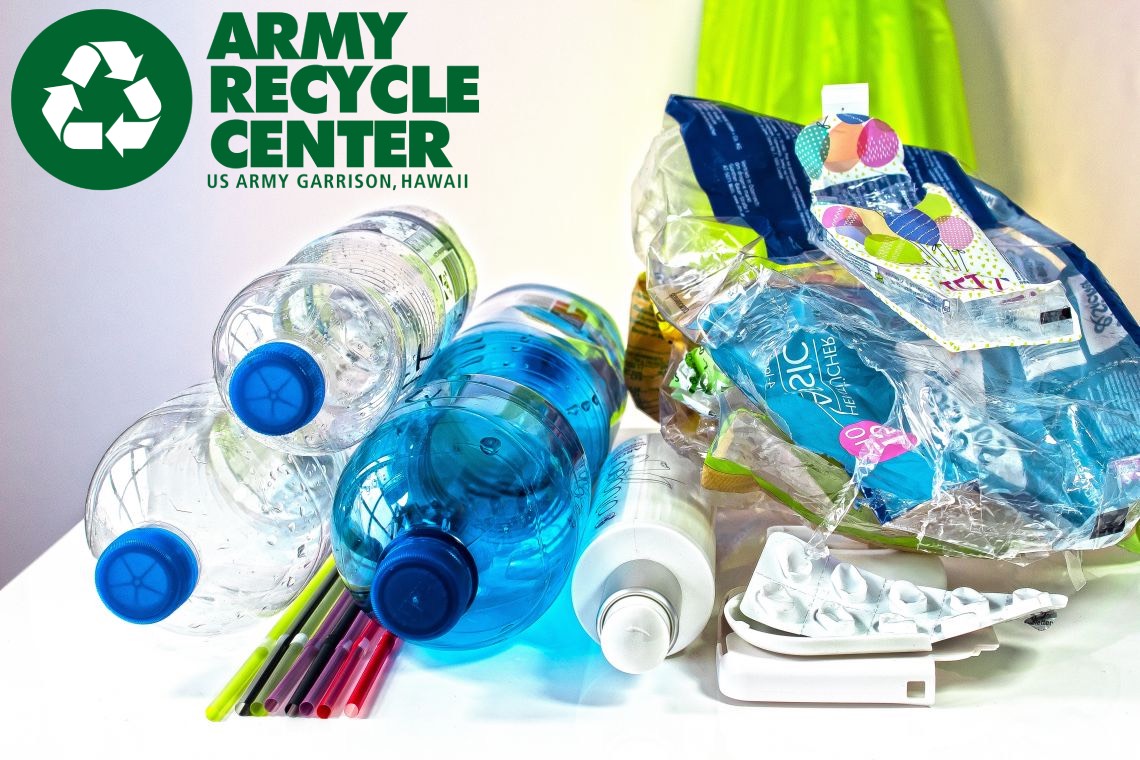
Take advantage of recycling programs available on post! Recycling is a simple way that you can help out the environment and preserve our natural resources from being depleted. Proceeds from the garrison's qualified recycling program help fund environmental projects and Family and Morale, Welfare and Recreation events for the community.
Recyclables can be dropped off at the Army Recycling Center during the center's hours of operation. You MUST call ahead and make an appointment before taking wood and green waste to the center.
Army Recycle Center: (808) 861-2720
>>Check out our recycling matrix, which outlines who can dispose of specific items where.
Items We Accept
Acceptable items are subject to change due to site capacity, restrictions, funding, and other factors.
- Color paper
- Dry cardboard
- Glossy paper
- Green waste
- Hard plastic containers #1-5 (containers must be rinsed out; no segregation required)
- HI-5 glass, plastic, aluminum beverage containers
- Newspaper
- Non-corrugated cardboard
- Scrap metal (uncontaminated) to include aluminum and steel cans
- Toner cartridges
- White office paper (shredded must be bagged)
- Wood pallets (unpainted/untreated, and in limited quantities only)
- Wood and green waste (require an appointment, please call to coordinate)
Items We Do Not Accept
- Appliances
- Batteries
- Electronic Waste
- Fluorescent bulbs
- Furniture
- General refuse (trash)
- Hazardous waste
- Mattresses
- Flexible plastics (grocery bags, cereal box liners)
- Vehicle waste, oil, tires
The City and County of Honolulu provides ten public refuse drop-off locations: seven convenience centers and three transfer stations around the island for Hawaii residents to dispose of their household rubbish.
Hawaii residents may use any of these locations free of charge.
For more information on the refuse drop-off locations, visit Waste Drop Off locations | Department of Environmental Services.
P2/ReusePrograms
Pollution Prevention (P2) is a comprehensive initiative to reduce and prevent pollution at the source. It focuses on conservation of resources, replacement of hazardous materials with less hazardous materials, waste reduction, recycling, and other preventive means to successfully and cost effectively avoid, prevent, or reduce the generation of pollutants. (from US Army website)
Army Recycle Program's Office Furniture Reuse Marketplace
The Furniture Reuse Marketplace ✪ is an exchange system for used, but functional government furniture and excess office supplies on U.S. Army Garrison Hawaii installations. Click here for a guide to using the marketplace.
Thrift Stores
Donating gently used personal items to thrift stores on-base and off-base is a great way to give these items a new life.
Resources
Army Recycle Program Information
Recycling Signage
Kuleana Newsletter
The Compliance Branch publishes its Environmental Compliance Newsletter four times a year. Full issues are available to download below.
- Winter - 2026
- Fall - 2025
- Fall - 2025
- Summer - 2025
- Spring - 2025
- Winter - 2024
- Fall - 2024
- Summer - 2024
- Spring - 2024
- Fall - 2022
- Summer - 2022
- Spring - 2022
- Winter - 2022
- Fall - 2021
- Summer - 2021
- Spring - 2021
- Winter - 2021
- Fall - 2020
- Summer - 2020
Interested in subscribing? Send an email to usarmy.hawaii.recycling@army.mil.
Policies and Regulations
- Garrison Policy Memorandum 4: Environmental Compliance and Protection Program
- Garrison Policy Memorandum 11: Solid Waste and Recycling
- Army Regulation 200-1: Environmental Protection and Enhancement
- Army Regulation 420-1: Army Facilities Management
- Executive Order 13834: Efficient Federal Operations
- Resource Conservation and Recovery Act (RCRA)
- Memorandum: Revision to the Department of Defense Integrated Solid Waste Management Metrics
Tenant Recycling Information
- Unaccompanied Soldiers (on-post residents): Contact the Army Recycle Program at (808) 787-0867 or usarmy.hawaii.recycling@army.mil for more information
- On-post residents: Island Palm Communities (IPC) collects all refuse, recycling, and bulky items from IPC housing residents. Visit https://www.islandpalmcommunities.com/resident-resources/ ⚠ for more information.
- Off-post community members: The City and County of Honolulu collects refuse and recycling from off-post residents. Contact them directly to learn more about their services. (https://www.opala.org/) The City and County of Honolulu provides nine public refuse drop-off locations: six convenience centers and three transfer stations around the island for Hawaii residents to dispose of their household rubbish. Hawaii residents may use any of these locations free of charge. For more information on the refuse drop-off locations, visit Waste Drop Off locations | Department of Environmental Services
Solid Waste
Trash/refuse dumpsters are placed strategically across all U.S. Army Garrison Hawaii Installations for use by units and organizations. Each building has a dedicated or shared dumpster, and occupants are expected to ensure that only acceptable materials are placed in these dumpsters.
Acceptable items must be placed inside of the dumpster, and the lid must close. Any items placed outside of the dumpster will not be collected. If items are blocking the front of the dumpster, there will be a halt of service until rectified.
UNACCEPTABLE items include:
- Recyclable items, such as:
- Cardboard
- Plastic Bottles
- Paper
- Metal Cans
- Hazardous Materials
- Green Waste
- Bulky items, such as:
- Wood
- Furniture
- Mattresses
- Oil, POV Oil
- Vehicle Parts
To learn more about disposal options for the items NOT allowed in trash/refuse dumpsters, check out the Directorate of Public Works' Sustainability and Environmental Topics A-Z guide.
Are you an Island Palm Communities' housing resident? IPC Housing collects refuse, recycling, and bulk waste right from your curb! Visit their website for more information at https://www.islandpalmcommunities.com/resident-resources/⚠.
Unit Challenge
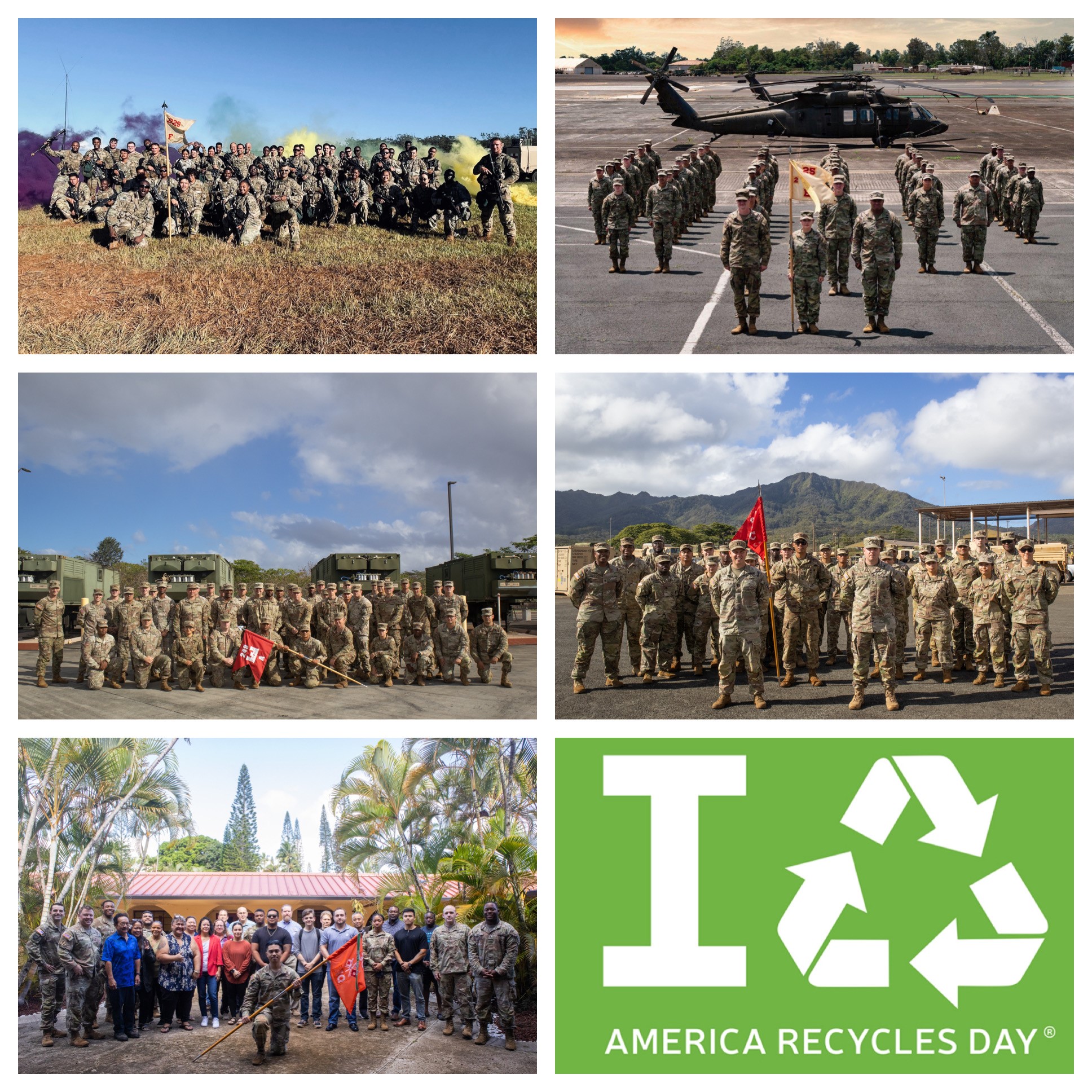
The Army Recycle Challenge is a way to encourage Recycling and Recycling right!
The Army Recycle Program conducted the Army Recycle Challenge from Aug. 1-Oct. 31 at the company level. Participating companies were challenged to decrease waste and increase recycling by recycling right.
It was not about how much was recycled but how well they recycled. The Army Recycle Program is proud to say that many of the companies were up for the challenge and are now recognized as 'Recycle Heroes:'
- A Co 249th EN BN Award: Gold $500 Top Recyclers
- FSC 84th EN BN Award: Gold $500
- F FSC 2-11 FA Award: Gold $500 Most Improved
- HHD 30th Signal BN Award: Gold $500
- E Co 2-25th AVN REGT Award: Gold $500
- C Co 3-24 AVN Award: Gold $500
- E Co 209th ASB Award: Bronze $100


